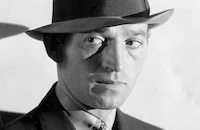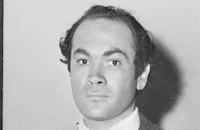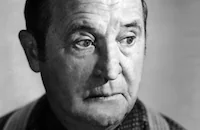Little Tokyo, U.S.A.
Cast & Crew
Otto Brower
Preston Foster
Brenda Joyce
Harold Huber
Don Douglas
June Duprez
Film Details
Technical Specs

Synopsis
On 1 November 1941, American-born Japanese businessman Ito Takimura meets with Japanese spies in Tokyo. Takimura is welcomed into the Black Dragon Society and urged to use his importing business as a front for gaining information about Pacific Coast industries and defense plans. When Takimura returns to his home in the Little Tokyo section of Los Angeles, he organizes his compatriots, Kingoro, Satsuma and German-American spy Marsten. As the weeks pass, police detective Michael Steele becomes suspicious that there are spies in the area, but Takimura assures him that he is mistaken. Mike's suspicions are heightened, however, when he stops two boys from fighting and one of them, Satsuma's son Suma, brags that his father talks to Tokyo every night on a radio. Mike asks an old friend, Oshima, to investigate Satsuma, then goes to the radio station, where his girl friend, Maris Hanover, works as a commentator. Maris derides Mike's fears of espionage, but later that night, after Oshima fails to meet them, she accompanies Mike to Oshima's apartment, where they discover that the Okono family has moved in and claim no knowledge of Oshima's whereabouts. Mike rushes to Satsuma's house to search for the radio, but finds no transmitting devices or evidence concerning Oshima's disappearance. Satsuma introduces Mike to Teru, a beautiful young woman Satsuma claims is his daughter, but who is really the mistress of Hendricks, Maris' boss. The German-American Hendricks is secretly in league with Takimura and the others, and allows them to use the radio station's transmitter to relay signals to Japanese ships late at night. After leaving Satsuma's home, Mike goes to the morgue, where his pal Jerry shows him a decapitated corpse. Mike recognizes the body as Oshima's from a scar on his shoulder and realizes that the mode of killing indicates that his friend was murdered by the Black Dragon Society. On 4 December 1941, police captain Wade informs Mike that pressure from prominent Japanese businessmen has resulted in his transfer to another precinct, to take effect in four days. Mike asserts that the transfer proves he is close to catching the spies, and his refusal to cease his investigation prompts Takimura to use Teru as bait in a trap. On the night of 6 December, Teru invites Mike to Satsuma's house, where she drugs him. As Mike sleeps, Hendricks and Takimura kill Teru and make it look as if Mike murdered her while trying to assault her. Mike is arrested for the murder, and the next morning, is in prison when he learns of the Japanese attack on Pearl Harbor. Mike then escapes from jail and soon discovers where Takimura, Hendricks and the others meet. With Maris' help, Mike tricks the spies into revealing their activities while the police listen, and soon the gang is rounded up. After Japanese Americans on the West Coast are taken to internment camps, Little Tokyo becomes a ghost town, and Maris comments on her radio show that loyal Japanese Americans must suffer along with the disloyal in the interest of national security. She then reads an excerpt of Robert Nathan's poem "Watch America," and urges Americans to maintain their vigilance against espionage.

Director
Otto Brower
Cast

Preston Foster

Brenda Joyce

Harold Huber

Don Douglas

June Duprez

George E. Stone

Abner Biberman
Charles Tannen

Frank Orth
Edward Soo Hoo
Beal Wong
Daisy Lee
Leonard Strong

J. Farrell Macdonald

Richard Loo
Sen Yung
Melie Chang

Millard Mitchell
Tommy Tucker

Emmett Vogan
Mel Ruick
John Wald
Lester Dorr
James Farley
Emory Parnell
William Forrest
Nino Pipitone
Crew
Harry Brand
George Bricker
Richard Day
Bryan Foy
Bernard Freericks
William Goetz
Herschel
Harry M. Leonard
Thomas Little
Joseph Macdonald
Emil Newman
Maurice Ransford
Harry Reynolds
Sam Schneider

Film Details
Technical Specs

Quotes
Trivia
Notes
After the film's opening credits, a spoken prologue states: "For more than a decade, Japanese mass espionage was carried on in the United States and her territorial outposts while a complacent America literally slept at the switch. In the Philippines, in Hawaii, and on our own Pacific Coast, there toiled a vast army of volunteer spies, steeped in the traditions of their homeland: Shintoists, blind worshippers of their Emperor....This film document is presented as a reminder to a nation, which until December 7, 1941, was lulled into a false sense of security." The prologue is spoken over shots of Japanese people photographing U.S. military installations and industrial factories. According to a studio press release, the film was based on actual incidents of Japanese espionage in the Los Angeles area, as described in government records. The Hollywood Reporter review and the studio story files note that the opening credits include a statement claiming that "All of the incidents in this motion picture having to do with espionage are based on facts." The statement was not in the print viewed, however.
According to Hollywood Reporter news items, the film was originally to be directed by Eugene Forde. A April 30, 1942 studio press release announced that John Shepperd and Nancy Kelly would have the leading roles. Although a March 6, 1942 Hollywood Reporter news item stated that the film would be set on Terminal Island near San Francisco, an March 11, 1942 Hollywood Reporter news item noted that producer Bryan Foy had sent a camera crew to the First and Los Angeles streets area in Los Angeles because he had realized that "the local little Tokyo May soon look like a deserted village when the Japanese are removed." According to a studio press release, by the time production actually began, Little Tokyo was too deserted to be used as a location, and so the picture was partially shot on location in Los Angeles' Chinatown. After the picture had completed shooting, a June 5, 1942 Hollywood Reporter news item commented that "some fast scoring and editing" was being done to finish the film in order "to get the picture before the public before the evacuation of Japanese fades from the front pages." While praising the timeliness of actual footage of the evacuation of Japanese Americans from Los Angeles, some contemporary reviews dismissed the film as a routine spy melodrama. The New York Times reviewer commented, "the film as a whole is so larded with hackneyed plot devices and stock Nipponese characters that it smacks more of the conventional spy story than anything else." None of the actors in the film were Japanese, which the Hollywood Reporter review noted when it praised the performances of the "occidentals who play amazingly realistic Orientals" and "the group of Chinese actors who do not mind defaming Japanese."












